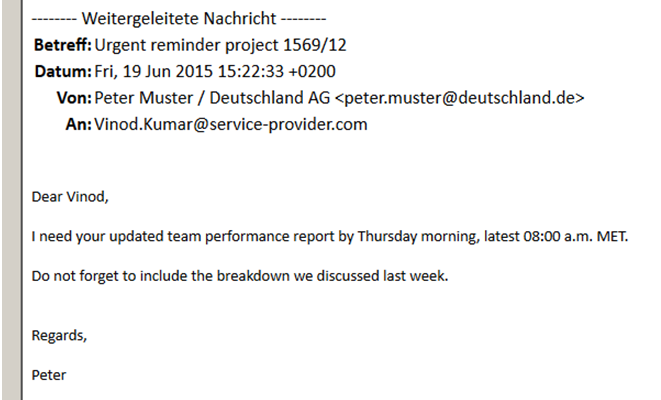by Hermann Kracke
Didn’t I just say 'try harder to get the task done correctly' and 'make more effort than is expected of you'? And that the 'customer is king' and should always be the center of attention?
Well, yes and both statements are true. The German communication style of low context still allows you to disagree when somebody crosses a red line or something is - whatever way you look at it - simply not feasible.
Nobody likes to be rejected but in Germany - unlike in many other countries - there not only is a clear word for no ('nein') but it is also actually possible to use it in personal or professional interactions without losing face.
In fact, it will be expected when something goes wrong, a deadline cannot be met or new requirements of your customer - even after your best effort - remain unreasonable - you express your objection clearly.

They mean what they say and they say what they mean
Now what is that low or high context about anyway? This culture concept of communication context claims that many cultures differ in the degree of how much else beyond plain words is routinely used to put a message or meaning across. The choice of words itself as well as typical sentence structure and length also matter in this respect though.
Whereas in higher context cultures such as India many things tend to be left unsaid (but are understood non-verbally or indirectly) German managers broadly speaking communicate in a rather explicit, frank, sometimes even undiplomatic way.
When your German business partner in a meeting comes to the point quickly and unambiguously tells you what she sees or wants - these probably are examples of low context communication and task orientation.

What is said is important - not so much how it is said
If they send you an email which is barely a few lines and sounds more like a command, lacking almost any human touch you rather consider what is said and not bother for too long how it’s been expressed.
Your German contact at the other end has quite likely not even noticed her words might sound impolite or harsh to others.
Although it may take a while getting comfortable with this style of communication - in business it can actually be a welcome, time-saving experience which allows you to focus on a customer problem in a radically efficient manner without having to dance around an issue for long.

(Constructive) criticism in Indo-German collaboration
A downside of it, however, often crops up when it comes to criticism and disagreement. It’s one thing feeling slightly disturbed by a partner’s inconsiderate remark but another being told bluntly face to face that one’s own performance does not meet expectations whatsoever.
Still when two or more parties work together there will always be a time you disagree and dealing with it undoubtedly is part of any healthy relationship. It can happen occasionally or quite frequently even in great companies and time-tested partnerships.
Put the rule to the test!
With the Indian colleagues I work with every day - whenever such a 'devastating verdict' from a German partner hits them - we together aim to address the matter unemotionally and
1. Really try to get a good grasp of what has happened in a matter-of-factly way.
2. We phrase a response to it saying that we are earnestly working to understand what has gone wrong. Also
promise to get back to them at the earliest once the problem has been thoroughly investigated.
Remember: No response also is a response!
3. While it is ok to admit that you regret inconveniences caused I would avoid making lengthy excuses.
German managers tend to interpret those as a lack of professionalism and confidence.
4. We usually set a deadline by when our initial assessment shall be complete.
5. We do not waste much time reading between the lines suspecting some additional meaning or hidden agenda.
Of course, also in Germany there can be more to an issue than appears at first sight but it should here not be your default approach searching for one.
6. We do not look for personal faults at the beginning even if someone specific in the department has been
addressed personally.
When management needs to be kept in the loop I find it better to replace employee names by a generic term, e.g. a [company name] user.
Obviously, one should later ensure to set the record straight with concerned people and allow the organization to learn - but it usually does not help to severely criticize a person you actually want to actively contribute sorting out the issue.
Another trick is to use more passive language word order, for instance, when preparing a report. Instead of 'Employee Mr. K. failed to use the latest file version which resulted in a critical process abort' you put 'An outdated file version was used at the time of … resulting in a…'.
Again, the idea not is to sweep things under the rug but to keep up internal communication and use your energy primarily to
support your customer.

7. If we can despite of our effort not fully understand the core of the problem we go and ask our German partner about what is meant.
Voice questions in a clear and polite but not self-depreciating way.
8. Share the results of your analysis honestly so the partner can arrive at her own conclusions.
And do not forget to include all relevant facts and details, mention exact numbers, and provide evidence for your own findings.
9. If mistakes have happened we admit the same, take responsibility and do not try to blame it on dubious external circumstances.
10. If we contradict to what has been brought forward by a German process owner, however, we also say this clearly and offer an opportunity to discuss the problem. Schedule an appointment right away showing you are sincerely hoping to fix it as soon as possible.
Replying 'maybe' to Germans to be polite can lead to many more problems than a clear 'no'!
Keeping these points in mind you, too, will weather the storm. Don’t let communication die down at any point.
Saying 'no' not is a problem in Germany but indecisiveness, uncertainty and vagueness are.


Write a comment